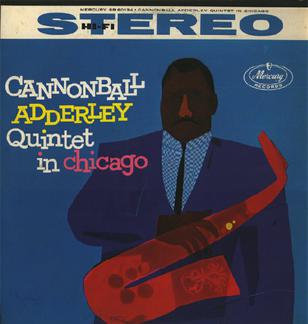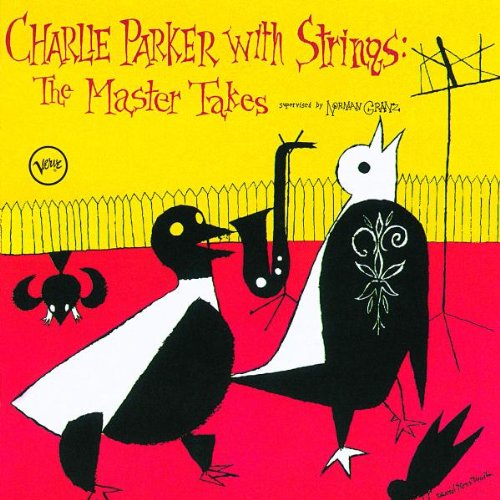Recent listening, current
Archived listening, 2013-2016
Showing posts with label mercury. Show all posts
Showing posts with label mercury. Show all posts
Friday, November 15, 2013
149. Cannonball Adderley Quintet in Chicago (1959)
Cannonball Adderley Quintet in Chicago (aka Cannonball & Coltrane on Limelight LS 86009) is a splendid disc from the core band that recorded Kind of Blue. "Limehouse Blues" stands ragtime roots on their head in the attitude of hard bop. A sparring match between alto and tenor proceeds at breathtaking pace until the tune reels in for a final, punctual tutti on the main theme. "Stars Fell on Alabama" is next and features very sensitive embellishments from Adderley. Kelly goes next, tinkling single notes into the dusty register. As saxes go, it's a pleasure to hear the two styles in opposition. Adderley and Coltrane ride atop the rhythmic swell and strike the bar at will. But the two players are not very similar. Contrast their rhythmic interpretations of "Wabash," or technique in "Grand Central," which crackles with Trane's rhythmic inventions in fast triplets. The ballad "You're a Weaver of Dreams" is handed to Coltrane, and Kelly strolls through some jaunty figures that recall the old school with aplomb. On each track, whether it's Adderley busting open the guts of the melody and improvising endlessly thoughtful variations on its theme, or Coltrane boldly probing the rhythmic and harmonic architecture, there's always something to hang an ear on. This disc is a fine compliment to Kind of Blue, Somethin' Else, and At Newport 1958.
Friday, September 6, 2013
133. Roland Kirk / We Free Kings (1961)
This early album by Roland Kirk demonstrates some of the things he became known for a bit later on. It's a polished, enjoyable, and provocative album. Most notably, throughout the blues and soul inflected set, he plays two or sometimes three instruments at once and switches between them at lightning speed. While blowing the blues on the flute, he likes to screech, howl, and sing along. There aren't any drop-ins from the board, no spliced takes. Obviously with one man filling four chairs, the arrangements revolve around him. As a testament to his talent, it works seamlessly. Kirk has an inspiring technique and sweet tone on all instruments. His style of improvising, I think, clearly departs from the Coltrane bag he was once lumped into. The band is Hank Jones or Richard Wyands, drums is Charlie Persip (great choice), and bass is Art Davis or Wendell Marshall. Through his technique and instrumentation, Kirk puts a unique spin on old tunes, and kicks out his own compositions, as well. After this album, Kirk's journey continued to seek new directions, ever expanding, ever exploring. We Free Kings isn't just nice for listening, it's also nice for perspective. It shows his music is steeped deeply in blues and bop, but the trajectory for future dates would always be farther out than before.
Labels:
1961,
art davis,
charlie persip,
flute,
hank jones,
hard bop,
manzello,
mercury,
quartet,
review,
richard wyands,
roland kirk,
stritch,
tenor sax,
tenor saxophone,
verve,
we free kings,
wendell marshall
Wednesday, September 4, 2013
130. Charlie Parker / Charlie Parker with Strings: The Master Takes (1995)
If you're only interested in Bird's famous recordings with a small orchestra, then you can save a little coin with this attractive disc. (It's only fair to say that for just a few extra bucks, $20 on average for used, you can have all the material here plus much more and better liner notes if you buy the Complete Verve Masters.) But as this disc's title indicates, it contains the complete master takes of Bird's famous 1950 sessions with strings. In addition to the 14 tracks contained on the original two LPs by Mercury, the Verve CD contains 10 bonus tracks recorded 1947-1952. The orchestral numbers are all standards, and when they work, it's magic. Some have argued that this was a commercial sell out. It was so successful that it led to a flood of other artists playing with strings. The truth is that Parker himself always wanted to play with an orchestra, and these recordings fulfilled his dream. In the greater context of jazz today, I think it's a stale argument and intentions don't matter. Who cares whose idea it was? Hey, it's Bird, there's some extra musicians, and the result is warm, elegant, and hard to turn off. Whoever can't enjoy such an engagement must be difficult to please. Likewise are my feelings for Cliff Brown, Dizzy, or anybody else who went in the studio with an orchestra in the 1950s.
Labels:
1947,
1948,
1949,
1950,
1951,
1952,
bebop,
bop,
charlie parker,
charlie parker with strings the complete master takes,
mercury,
orchestra,
review,
tenor sax,
tenor saxophone,
verve
Subscribe to:
Posts (Atom)


